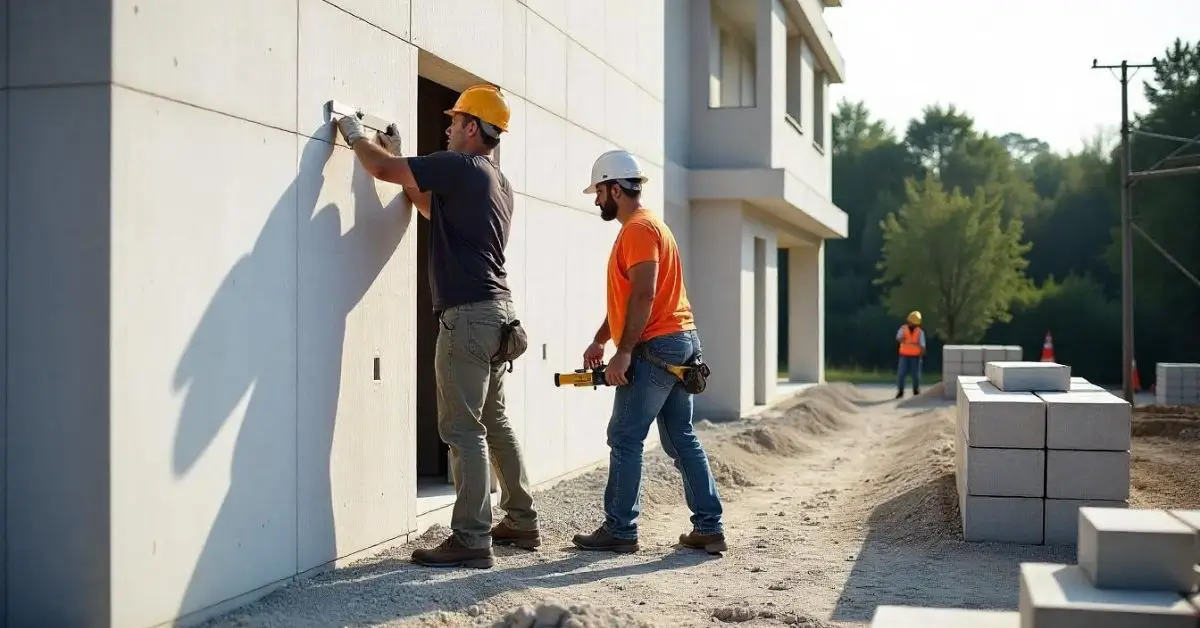HOME IMPROVEMENT
New Home AC Installation: Key Considerations for Homeowners

Installing a new air conditioning (AC) system in your home is a significant investment that requires careful planning and consideration. Whether you’re building a new home or replacing an old AC unit, understanding key considerations for AC setup is essential. This article will explore important factors that homeowners should keep in mind when installing a new AC system.
1.Assessing Cooling Needs
The first step in new home air conditioner installation is assessing your cooling needs. Consider the size of your home, number of rooms, insulation quality, and local climate. An HVAC professional can perform a load calculation to determine the right size and capacity of the AC unit needed for optimal cooling.
2.Choosing the Right AC Unit
Selecting the right AC unit is crucial for efficiency and comfort. Consider factors such as energy efficiency ratings (SEER), technology features, brand reputation, and warranty coverage. Discuss your options with HVAC professionals to choose a unit that meets your cooling needs and budget.
3.Ductwork Evaluation
Evaluate the condition and design of your home’s ductwork. Properly sized and sealed ductwork is essential for efficient airflow and cooling distribution. In some cases, ductwork modifications or upgrades may be necessary to optimize AC performance.
4.Location and Placement
Decide on the location and placement of your AC unit. Outdoor units should be placed in a shaded area away from direct sunlight and debris, while indoor units should be installed in a central location with sufficient airflow and access for upkeep.
5.Energy Efficiency Considerations
Opt for energy-efficient AC units that can lower your utility bills and reduce environmental impact. Look for units with high SEER ratings and ENERGY STAR certification. Consider additional features such as programmable thermostats and zoning systems for enhanced energy savings.
6.Proper Sizing
Ensure proper sizing of your AC unit based on load calculations and square footage of your home. Oversized units can lead to short cycling and inefficient operation, while undersized units may struggle to cool adequately. A properly sized unit ensures optimal performance and comfort.
7.Installation Permits and Codes
Check local building codes and regulations regarding AC setup permits. Obtain necessary permits and ensure compliance with safety standards and requirements. Hiring licensed HVAC professionals ensures proper integration and adherence to codes.
8.Professional Installation
Hire experienced and reputable HVAC contractors for new home AC installation in Flat Rock, MI. Professional integration ensures proper sizing, placement, and configuration of your AC system. Contractors can also provide maintenance tips and warranty information for long-term reliability.
9.Ductless Mini-Split Systems
Consider ductless mini-split systems as an alternative to traditional ducted AC units. Mini-splits offer flexible zoning, energy efficiency, and simplified assembly in homes without existing ductwork or limited space.
10.Maintenance and Warranty
Discuss maintenance requirements and warranty coverage with your HVAC installer. Regular AC maintenance, such as filter changes and system inspections, ensures optimal performance and longevity. Understand warranty terms and coverage for repairs and replacements.
New home air conditioner setup requires careful consideration of cooling needs, AC unit selection, ductwork evaluation, location placement, energy efficiency, proper sizing, permits, professional construction, ductless options, maintenance, and warranty coverage. By addressing these key considerations, homeowners can enjoy efficient cooling, comfort, and peace of mind with their new AC systems. Consult with HVAC professionals for personalized recommendations and expert installation services tailored to your home’s needs.
Ready for a new AC assembly? Trust the experienced HVAC professionals from Superior Comfort Heating and Cooling for expert service and optimal cooling comfort. Contact (734) 818-7141 today for a consultation and hassle-free setup!
HOME IMPROVEMENT
Your Partner in Clean: Commercial Cleaning Experts

Ever wonder why some places always look neat, bright, and fresh each day?
A clean space helps people feel calm, focused, and ready to get things done. For many busy workplaces, staying clean takes more than a quick sweep or wipe. If you’ve been trying to keep up or want better results, there’s a smarter way.
Keep reading to see how trained cleaning experts can make a big difference every day.
Clean Workspaces Boost Focus
It’s hard to focus when trash piles up or floors feel sticky under your shoes. A clean space helps your mind stay clear and your work move faster.
When everything looks neat, people feel more at ease and less stressed. Even the air can feel lighter in a well-kept space.
Clean work areas help limit distractions and reduce tension during the day. With less mess around, it’s easier to stay on track and finish tasks. A little cleaning goes a long way.
Tools That Get Results
Using the right tools makes a big difference in how clean things get. Strong vacuums, steady mops, and quiet machines help workers clean faster and better.
These tools reach deep corners and pick up more dirt than hands alone. They help save time while also making each task more complete. With better tools, cleaners work faster without missing the hard parts.
Each pass leaves the area looking fresher and feeling safer. Good gear helps get strong results and keeps things moving.
Trained People, Better Service
Cleaning takes more than wiping a surface or sweeping the floor. Trained cleaners spot small messes and know where to focus first. They move with care and work in a steady, thoughtful way each time.
Their timing, attention, and effort all help the job come out better. They clean deeper and faster because they know what each task needs.
That kind of skill doesn’t come by chance. It grows with training and time. A well-trained cleaner helps your space feel neat, safe, and fresh.
Flexible Cleaning Schedules
Some places need cleaning early, while others need it after everyone goes home. That’s why flexible cleaning hours can help so much in busy workplaces.
Every place runs on a different clock, and cleaning should fit right into that flow. Teams can come in during slow hours or once the day ends.
For those in or near the area, corporate cleaning services in Alabama and Tennessee often offer this kind of setup. It helps keep things clean without getting in the way of daily work.
Health Hazards Get Reduced
Germs can spread fast when floors, desks, and handles stay dirty for too long. A clean space helps stop that from happening and keeps people from getting sick at work.
Regular cleaning clears away dust, trash, and germs that build up each day. When the air feels fresh and the surfaces stay clean, people feel safer, too.
It also helps cut down on sneezing, coughing, and other signs of poor air. Clean areas lower the chance of sickness and make the space feel much better.
You Can’t Go Wrong With Commercial Cleaning Experts
A clean place helps people feel good and work better. When trained cleaners handle the job, you don’t have to worry about dust, mess, or germs. They know what to do and how to do it right.
With the right help, your space can stay neat every day. It saves time, keeps things safe, and makes your workplace a better place to be.
HOME IMPROVEMENT
Freephonenum: The Future of Hassle-Free Virtual Communication

In a world increasingly reliant on digital connectivity, freephonenum services have emerged as indispensable tools for privacy-conscious users, digital nomads, businesses, and online shoppers. Whether you’re trying to sign up for an app, verify your account, or manage customer relations, virtual phone numbers provide unmatched convenience and anonymity. As the demand for online identity protection grows, understanding how freephonenum solutions work and why they’re trending becomes essential for both individuals and organizations.
These services allow users to generate temporary or permanent virtual numbers without needing a physical SIM card or traditional phone line. They are fast becoming a staple for verification, communication, and even automation. In this in-depth guide, we’ll explore how freephonenum tools work, who should use them, key benefits, comparisons, and expert insights that will help you confidently navigate this powerful technology.
What Is a Freephonenum and Why Is It So Popular?
A freephonenum is a virtual telephone number that lets users send and receive messages or calls over the internet—typically without requiring a subscription or physical infrastructure. Unlike standard cellular plans, these numbers are accessible online and often used for one-time verifications or low-commitment communications.
What makes freephonenum platforms attractive is their low cost, ease of use, and privacy protection. These tools are ideal for situations where users don’t want to expose their personal numbers. From developers testing SMS functionality to users registering anonymously on social platforms, freephonenum services offer a layer of security that’s difficult to ignore.
Benefits of Using a Freephonenum Service
The value proposition of freephonenum tools extends far beyond simple convenience. Here are some of the leading benefits:
Privacy and Anonymity
Using a virtual number ensures your real phone number stays private. Whether signing up for newsletters or creating accounts, freephonenum keeps your personal data safe from spam and misuse.
Cost-Effective Communication
As the name suggests, most freephonenum services are either completely free or offer basic functionality without cost. This is a massive plus for startups, freelancers, or budget-conscious users.
Flexible and Disposable
Need a number just once? Many freephonenum platforms offer disposable numbers that you can discard after use. It’s ideal for one-time SMS verifications or avoiding long-term commitments.
No Hardware Required
Forget physical SIM cards or extra mobile devices. A stable internet connection is all you need to access a freephonenum.
Global Access
Some freephonenum services provide international numbers, making them excellent for businesses expanding into global markets or users wanting a local presence abroad.
Who Should Use a Freephonenum?
Freelancers and Remote Workers
Digital professionals often need to sign up for tools, test applications, or interact with international clients. A freephonenum offers flexibility without requiring a secondary phone.
Online Shoppers
For one-time deals or account verification, a virtual number protects your primary number from unsolicited marketing.
Small Businesses
Managing customer service or running SMS campaigns is easier when using a dedicated freephonenum. It enhances professionalism and keeps communications organized.
Developers
QA teams and software engineers can simulate phone number input, SMS validation, and other mobile features during testing without incurring costs.
Core Features of a Freephonenum Platform
The reliability and functionality of any freephonenum service depend on certain critical features. Let’s look at them:
Message Reception
Most platforms offer real-time message reception, which is crucial for verifications and alerts.
Call Forwarding
Some advanced options include forwarding incoming calls to a personal line or voicemail.
Number Rotation
Disposable and rotating numbers are useful for bypassing regional restrictions or avoiding blacklisting.
User Interface
A clean, simple dashboard makes it easier to manage multiple numbers and view message history.
Platform Compatibility
Whether you’re on desktop or mobile, most freephonenum solutions work across various operating systems and browsers.
Comparison Table of Leading Freephonenum Features
| Feature | Platform A | Platform B | Platform C | Platform D | Platform E |
|---|---|---|---|---|---|
| Cost | Free | Freemium | Free | Subscription | Free |
| Ease of Use | ★★★★★ | ★★★★☆ | ★★★★☆ | ★★★★★ | ★★★☆☆ |
| Efficiency | High | Medium | High | Very High | Medium |
| Number Variety | Global | Regional | Global | Global | Limited |
| SMS Delivery Speed | Fast | Moderate | Fast | Very Fast | Slow |
“The flexibility of virtual phone systems is transforming the way users approach digital communication,” says Dr. Jenna Alston, a telecommunication strategist with 15+ years of experience.
Common Use Cases for Freephonenum Solutions
Whether personal or business, the use cases are expansive:
- Signing up for online services (e.g., marketplaces, streaming platforms).
- Verifying OTPs for apps or social media accounts.
- Creating burner accounts for dating or classified ads.
- Managing customer inquiries via SMS.
- Testing SMS or voice features in software development.
Security Considerations When Using a Freephonenum
While freephonenum tools are convenient, not all platforms are equally secure. Some may reuse numbers across multiple users, exposing you to potential data leaks or hijacking.
Best Practices:
- Never use a freephonenum for banking or sensitive platforms.
- Clear your SMS history and avoid storing personal info.
- Use platforms with encryption and solid privacy policies.
Limitations to Keep in Mind
While highly versatile, freephonenum tools do have limits:
- Some services block verification from certain platforms.
- Numbers may get blacklisted if abused.
- Not ideal for long-term, professional communication unless upgraded.
If you plan to use a virtual number for extended business use, it’s worth considering premium versions or porting your number for long-term reliability.
Expert Insight: The Evolution of Virtual Communication
According to telecom expert Alex Herman, “We’re entering an era where phone numbers are no longer tied to hardware. Freephonenum tools exemplify this shift, allowing people to remain mobile, anonymous, and agile in how they communicate.”
This transformation is fueling the gig economy, supporting digital privacy, and enabling cross-border collaboration.
How to Choose the Right Freephonenum Tool
Selecting the right freephonenum service requires analyzing several factors:
Availability of Numbers
Opt for a platform that offers a wide range of numbers by region and purpose.
Delivery Speed
Check real-time performance, especially if using for 2FA or critical sign-ups.
3. User Reviews
Look for trusted ratings and community feedback on reliability.
Platform Support
Ensure compatibility with your mobile and desktop devices.
Extra Features
From call forwarding to auto-reply features, extra utilities can make a major difference.
Freephonenum vs. Temporary Phone Apps
| Criteria | Freephonenum Services | Temporary Phone Apps |
|---|---|---|
| Cost | Usually free | Often paid or limited trial |
| Registration | No sign-up needed | Requires app installation |
| Accessibility | Web-based, instant | Mobile only, slower setup |
| Anonymity | High | Medium |
| Customization | Limited | High |
The Legal Side: Are Freephonenum Tools Safe to Use?
Yes—when used ethically. While freephonenum services are legal in most countries, misuse (e.g., spam, fraud, or impersonation) is not. Always respect the terms of use and avoid platforms that allow unrestricted exploitation.
If you’re using these tools in a business context, it’s important to follow local regulations around virtual numbers and data protection. Misusing free numbers for shady activities could lead to permanent bans or worse—legal consequences.
Industry Forecast: What’s Next for Freephonenum Services?
Experts predict a surge in AI-driven verification systems, which may decrease the efficacy of traditional freephonenum services over time. However, hybrid solutions—combining temporary numbers with identity management APIs—will likely emerge as the next big trend.
Also, with growing awareness about data privacy, consumers will increasingly demand secure, transparent, and efficient communication alternatives—further boosting the relevance of freephonenum platforms in personal and professional environments.
Conclusion:
In today’s hyperconnected world, freephonenum is no longer just a workaround—it’s a smart, proactive choice for privacy, convenience, and digital efficiency. From businesses looking to streamline communication to individuals safeguarding personal details, this technology empowers users with control and flexibility.
As we advance into a privacy-first digital era, freephonenum will continue to play a critical role in reshaping how we engage online. With the right precautions, understanding, and use, virtual numbers can offer significant benefits with minimal drawbacks.
FAQ’s
What is a freephonenum used for?
A freephonenum is commonly used for receiving verification codes, registering for websites or apps, and managing online communications without revealing your personal number.
Is a freephonenum safe to use?
Yes, as long as it’s used for low-risk purposes like temporary sign-ups or testing. Avoid using it for banking or sensitive accounts.
Can I use a freephonenum for business?
Yes, many small businesses use virtual numbers for customer interaction, marketing, and automation, although premium versions are more suited for long-term reliability.
Are freephonenum services really free?
Most are free for basic SMS reception. Some offer paid upgrades for advanced features like voice calls, call forwarding, or dedicated numbers.
How do I know if a freephonenum is still active?
Messages will stop delivering if the number is inactive or blacklisted. Always test the number before using it on critical platforms.
Can a freephonenum be traced?
Since most freephonenum services don’t require registration, they’re hard to trace back to individuals. However, platforms may keep logs for security reasons.
HOME IMPROVEMENT
Autoclaved Aerated Concrete: The Smart Solution for Sustainable Construction

Autoclaved aerated concrete is a lightweight, thermally insulating, and energy-efficient building material created through a chemical reaction that expands a paste made from cement, sand, lime, gypsum, and aluminum. This mixture is then cured in a high-pressure steam chamber (autoclave), forming porous but strong blocks. Increasingly used in modern construction, autoclaved aerated concrete represents a sustainable and efficient choice.
As a prefabricated material, this type of concrete is known for its exceptional thermal insulation properties, as well as its low weight, making it easy to handle and significantly reducing construction time. Additionally, autoclaved aerated concrete is fire-resistant, mold-proof, and pest-resistant.
How is Autoclaved Aerated Concrete Manufactured?
The manufacturing process of autoclaved aerated concrete includes the following steps:
- Raw material preparation: Sand, cement, lime, and gypsum are mixed with water in a mixer.
- Adding the expansion agent: Aluminum reacts with the lime, releasing hydrogen and forming air bubbles.
- Pouring into molds: The mixture is poured into molds where it begins to rise.
- Autoclaving: The blocks are steam-cured under pressure, which gives them strength and dimensional stability.
- Cooling and storage: After drying, the autoclaved aerated concrete blocks are ready for delivery and installation.
Key Benefits of Autoclaved Aerated Concrete
Energy Efficiency
Due to its porous structure, autoclaved aerated concrete provides excellent thermal insulation, reducing energy consumption for heating and cooling. Buildings constructed with AAC can easily meet passive house standards.
Lightweight Construction
This material is 3–4 times lighter than conventional concrete, which, combined with its modular assembly system, results in superior handling and faster construction time.
Applications in Construction
Residential Housing
Autoclaved aerated concrete is the ideal choice for energy-efficient homes. It is used for external and internal walls as well as partitions, offering both thermal and acoustic comfort.
Commercial Buildings
Office buildings, commercial spaces, and warehouses benefit from the fire protection and acoustic advantages of autoclaved aerated concrete. It also shortens construction time, reducing total building costs.
Comparison: Autoclaved Aerated Concrete vs Other Materials
| Feature | Autoclaved Aerated Concrete | Brick | Non-Autoclaved AAC | Wood | Traditional Concrete |
|---|---|---|---|---|---|
| Weight | Very Low | Medium | Low | Low | Very High |
| Thermal Insulation | Excellent | Medium | Good | Medium | Low |
| Cost per Cubic Meter | Medium | Low | Medium | High | Medium |
| Fire Resistance | Very High | High | Medium | Low | Very High |
| Durability | High | High | Medium | Low | Very High |
Standards and Regulations for AAC
According to European standard EN 771-4, autoclaved aerated concrete must meet strict criteria for density, compressive strength, and thermal conductivity. These specifications ensure safety and technical performance.
“Lightweight prefabricated materials like AAC are becoming the backbone of sustainable construction in Central and Eastern Europe,” states an expert in the construction materials industry.
Installation and Handling of Autoclaved Aerated Concrete
Required Tools
- Special AAC saws
- Notched trowel for adhesive
- Bubble level
- Corner tools and spacers
Installation Steps
- Prepare the support layer
- Apply specialized adhesive
- Install blocks in a “lego”-style system
- Check for level alignment
- Finish with lightweight plaster
Common Issues and Solutions
Wall Cracking
These may occur due to thermal expansion or improper installation. Use reinforcing mesh and metal profiles at corners to prevent cracking.
Water Absorption
Being porous, AAC can absorb water if not properly protected. Solution: apply waterproof coating or weather-resistant exterior finish.
Environmental Impact
Autoclaved aerated concrete is known for its low carbon footprint. Thanks to its use of common mineral resources and energy-efficient production, it has a lower environmental impact than traditional materials. It is also recyclable.
Why Choose Autoclaved Aerated Concrete?
For real estate developers, builders, or individuals constructing sustainable homes, choosing autoclaved aerated concrete is justified by:
- Faster construction timelines
- Outstanding energy performance
- High fire and mechanical resistance
- Thermal and acoustic comfort
- Predictable construction costs
Conclusion
Autoclaved aerated concrete is a revolutionary material for modern construction, offering outstanding energy efficiency, ease of installation, durability, and fire resistance. If you’re looking to build a sustainable, comfortable, and efficient home, AAC is the right choice. Invest in a greener future with autoclaved aerated concrete.
FAQ’s
What is autoclaved aerated concrete?
It’s a lightweight, thermally insulating building material made in an autoclave through controlled chemical reactions, used for walls and partitions.
How fire-resistant is AAC?
Autoclaved aerated concrete is extremely fire-resistant, with a melting point above 1000°C.
Can AAC be used for high-rise buildings?
Yes, there are high-strength AAC variants suitable for tall structures with proper design considerations.
How much does a cubic meter of AAC cost?
Prices vary by density and manufacturer, generally ranging from 250 to 400 RON/m3.
Is autoclaved aerated concrete eco-friendly?
Yes, it’s recyclable, made with low energy consumption, and natural raw materials.
What adhesive should be used for AAC installation?
Special adhesives designed for AAC, either dry mix mortars or ready-to-use paste, should be used.

 Cartoon1 year ago
Cartoon1 year agoUnlocking the Potential of Nekopoi.care: A Comprehensive Guide

 Game1 year ago
Game1 year agoExploring Aopickleballthietke.com: Your Ultimate Pickleball Destination

 BUSINESS1 year ago
BUSINESS1 year agoWhat Companies Are In The Consumer Services Field

 BUSINESS1 year ago
BUSINESS1 year agoUnraveling the Mystery of 405 Howard Street San Francisco charge on Credit Card

 HOME IMPROVEMENT1 year ago
HOME IMPROVEMENT1 year agoVtrahe vs. Other Platforms: Which One Reigns Supreme?

 TECHNOLOGY1 year ago
TECHNOLOGY1 year agoThe Guide to Using Anon Vault for Secure Data Storage

 ENTERTAINMENT11 months ago
ENTERTAINMENT11 months agoUnderstanding Bunkr Album: A Comprehensive Guide

 ENTERTAINMENT1 year ago
ENTERTAINMENT1 year agoThe Epic Return: Revenge of the Iron-Blooded Sword Hound
















